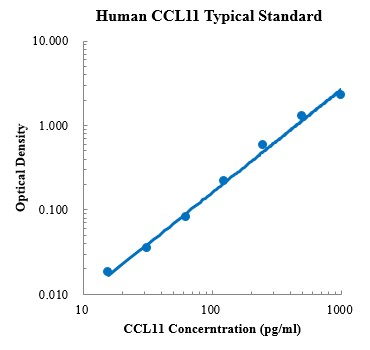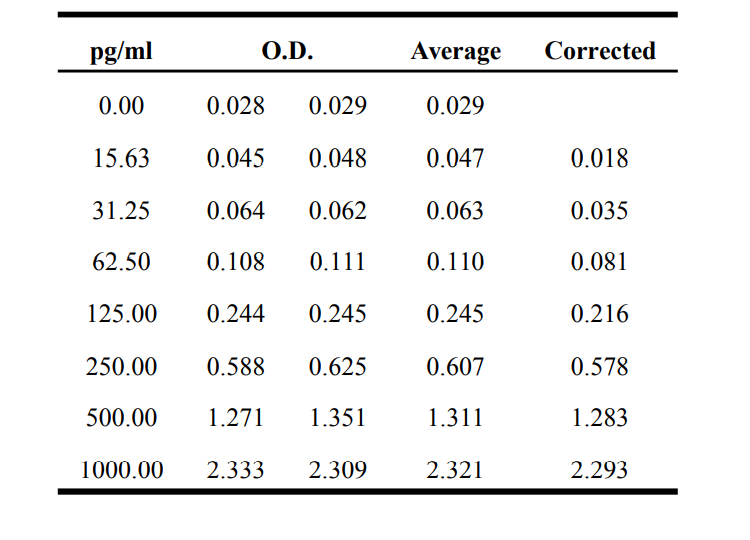
Human CCL11/Eotaxin ELISA Kit
$350.00 – $450.00
| Sample Type | Serum, plasma, cell culture supernatant, and other biological samples |
|---|---|
| Sample Volume | 50 μL |
| Sensitivity | 3.14 pg/mL |
| Range | 15.63 pg/mL – 1000 pg/mL |
| Assay Time | 3.5 h |
| Recovery | 82% – 107% |
| Average Recovery | 0.9 |
| Intra Precision | 4.5% – 6.5% |
| Inter-Precision | 5.9% – 8.1% |
| Platform | ELISA |
| Plate | Detachable 96-well plate |
| Size | 96T/48T |
| Storage | If the reagent kit is unopened, it should be stored at 4℃. However, if it has been opened, the standard solution should be stored at -20℃, while the other components should be stored at 4℃. |
| Delivery | 4℃ blue ice transportation |
| Components | 96-well polystyrene enzyme-linked immunosorbent assay (ELISA) plate coated with anti-CCL11/EotaxinA monoclonal antibody Human CCL11/EotaxinA freeze-dried standard CCL11/EotaxinA detect Antibody Standard Diluent Assay Buffer(10×) Substrate TMB Stop Solution Washing Buffer(20×) Sealing Film |
| Assay Principle | This kit utilizes the double antibody sandwich enzyme-linked immunosorbent assay (ELISA) detection technique.Specific anti-human CCL11 antibodies are precoated on a high-affinity ELISA plate. Standard samples, test samples, and biotinylated detection antibodies are added to the wells of the ELISA plate. After incubation, CCL11 present in the samples binds to the solid-phase antibodies and the detection antibodies. After washing to remove unbound substances, streptavidin-HRP labeled with horseradish peroxidase is added. After washing, a colorimetric substrate, TMB, is added and the plate is incubated in the dark for color development. The intensity of the color reaction is directly proportional to the concentration of CCL11 in the samples.A stop solution is added to terminate the reaction, and the absorbance value is measured at a wavelength of 450 nm (with a reference wavelength range of 570-630 nm). |
Targets
CCL11
CCL11 Target Infomation Overview
- Target Symbol: CCL11, C-C motif chemokine ligand 11
- Gene Groups: Chemokine ligands
- Alias: eotaxin; MGC22554
- Previous Names: SCYA11
- Alias Names: eotaxin-1; small inducible cytokine subfamily A (Cys-Cys), member 11 (eotaxin); chemokine (C-C motif) ligand 11
CCL11, C-C motif chemokine ligand 11 Target Infomation by Species
[su_tabs][su_tab title=”Human” disabled=”no” anchor=”” url=”” target=”blank” class=”tab-human”]
Human CCL11 Target Information
- Target Symbol: CCL11, C-C motif chemokine ligand 11
- Alias:
- C-C motif chemokine 11
- chemokine (C-C motif) ligand 11
- eosinophil chemotactic protein
- eotaxin
- eotaxin-1
- MGC22554
- SCYA11
- small inducible cytokine subfamily A (Cys-Cys), member 11 (eotaxin)
- small-inducible cytokine A11
- NCBI_Gene: 6356
- UniProtKB: P51671
Human CCL11 Predicted Functions
Enables CCR3 chemokine receptor binding activity; chemokine activity; and protein dimerization activity. Involved in several processes, including eosinophil chemotaxis; positive regulation of GTPase activity; and positive regulation of actin filament polymerization. Located in extracellular region. Implicated in asthma; human immunodeficiency virus infectious disease; and hyperglycemia. Biomarker of several diseases, including cystic fibrosis; hyperglycemia; lung disease (multiple); nephrotic syndrome type 1; and ureteral obstruction.
[/su_tab]
[su_tab title=”Mouse” disabled=”no” anchor=”” url=”” target=”blank” class=”tab-mouse”]
Mouse Ccl11 Target Information
- Target Symbol: Ccl11, chemokine (C-C motif) ligand 11
- Alias:
- eotaxin
- Scya11
- small inducible cytokine A11
- NCBI_Gene: 20292
Mouse Ccl11 Predicted Functions
Predicted to enable CCR3 chemokine receptor binding activity; chemokine activity; and protein dimerization activity. Involved in several processes, including modulation of age-related behavioral decline; negative regulation of neurogenesis; and positive regulation of angiogenesis. Acts upstream of or within branching involved in mammary gland duct morphogenesis and mammary duct terminal end bud growth. Predicted to be located in extracellular region. Predicted to be active in extracellular space. Is expressed in embryo; endocardial lining; liver parenchyma; liver vasculature; and yolk sac blood vessel. Human ortholog(s) of this gene implicated in asthma; human immunodeficiency virus infectious disease; hyperglycemia; and multiple sclerosis. Orthologous to several human genes including CCL11 (C-C motif chemokine ligand 11).
[/su_tab]
[su_tab title=”Rat” disabled=”no” anchor=”” url=”” target=”blank” class=”tab-rat”]
Rat Ccl11 Target Information
- Target Symbol: Ccl11, C-C motif chemokine ligand 11
- Alias:
- C-C motif chemokine 11
- chemokine (C-C motif) ligand 11
- eosinophil chemotactic protein
- eotaxin
- Scya11
- small inducible cytokine A11
- small inducible cytokine subfamily A11
- small-inducible cytokine A11
- NCBI_Gene: 29397
- UniProtKB: P97545
Rat Ccl11 Predicted Functions
Enables chemokine activity. Involved in several processes, including ERK1 and ERK2 cascade; leukocyte chemotaxis; and response to interleukin-13. Located in extracellular space. Used to study allergic rhinitis; asthma; pleurisy; and pneumonia. Biomarker of several diseases, including allergic conjunctivitis; pneumonia; prostatitis; rhinitis; and type 1 diabetes mellitus. Human ortholog(s) of this gene implicated in asthma; human immunodeficiency virus infectious disease; hyperglycemia; and multiple sclerosis. Orthologous to several human genes including CCL11 (C-C motif chemokine ligand 11).
[/su_tab][/su_tabs]
CCL11 Target News
[catlist tags=”ccl11″ template=targetnews thumbnail=yes thumbnail_class=”related-post-media clr” thumbnail_size=833]





